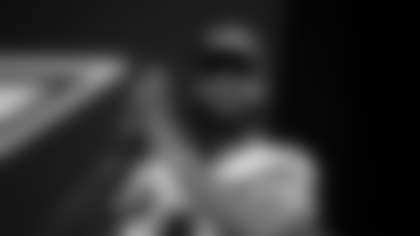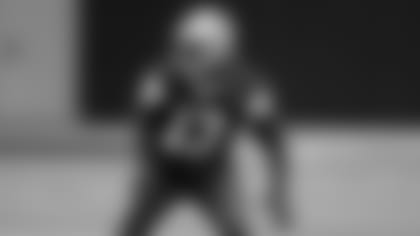IRVING, Texas – This made me chuckle the other day out here at The Ranch while watching Cowboys U teams compete in the late-arriving scorching summer heat:
The teams with the best quarterbacks were winning.
Something isn't it? Doesn't matter if it's the NFL, NCAA, high school or some 7-on-7 touch football game during a clinic. If you don't have at the very least a good quarterback, you ain't winnin'. Preferably everyone wants a great one.
Pretty simple.
And that brings us to the Dallas Cowboys, heading into this coming week's mandatory minicamp, the final offseason exercise before the five-week break and the July 28 takeoff for training camp. You know, looking back to last summer, pointed out then that the Cowboys, coming off that 12-4 season in 2014, had not posted back-to-back campaigns of at least 10 victories since going 12-4 in 1995 and 10-6 in 1996.
Well, that streak stretches to 20 years now, having gone 4-12 this past season, though bringing up another sort of streak heading into 2016: The Cowboys have not suffered back-to-back losing efforts since 2000-02. Yep, those ignominious three consecutive 5-11 seasons, the only such streak of ineptitude since going 7-9 in 1986, 7-8 in 1987, 3-13 in 1988, 1-15 in 1989 and 7-9 in 1990 – the franchise's longest streak of consecutive losing seasons since the identical five kicking off the franchise's history (1960-64).
Then there is this that occurred to me: Since righting the ship in 1991, the Cowboys have only suffered seven losings seasons over the last 25 years, and there is a common thread in six of those, the only exception being the 6-10 record of 1997 when Barry Switzer bottomed out.
The quarterback, through inadequate play, injury-interrupted play or getting kicked off the team, totally sunk each. Should not be shocking by any means. You can't fake quarterback.
After 1997 came the 2000 season, Troy Aikman's last. Though he started 11 games, health was an issue the entire time during the 5-11 year. In 2001, for health and ineptitude reasons, the Cowboys started four quarterbacks, going 5-11. In 2002, another 5-11 season, Chad Hutchinson took over for a struggling Quincy Carter eight games into the schedule. Neither was remotely adequate.
How 'bout the 6-10 of 2004? The Cowboys kicked Carter off the team early in training camp coming off a 10-6 record and playoff season, having to turn the offense over to then 40-year-old Vinny Testaverde, signed that year to become the veteran backup/babysitter.
After that, more current history, the Cowboys going 6-10 again in 2010, Tony Romo starting just six games, the first time he suffered a fractured collarbone … the first time he had missed an extended number of games in his career. And, of course, then this past 4-12 season, Romo starting just four games, but finishing only two of them.
All six of those losing seasons quarterback-infected. See what I mean?
Quarterbacks, quarterbacks, quarterbacks.
And we get it, all that concern out there over the Cowboys' quarterback situation. That Romo has just turned 36. That he has now fractured that same collarbone three times, twice this past season. That without Romo starting since taking over in 2006, the Cowboys own a 7-20 record, long-gone Jon Kitna responsible for five of those seven wins.
But maybe most of all, that Kellen Moore is the backup quarterback, entering his fifth season with only three NFL games of experience and two starts under his belt, all coming in the final three games of last year's washed-out season. All I can hear is, what the Cowboys thinking about?
Well, in this emotionally-charged, presidential-election year, let me say this about Moore's status, and no one knows this better than he does (and quiet as it's kept, so, too, COO Stephen Jones, head coach Jason Garrett and OC Scott Linehan):
Moore is the presumptive backup quarterback. Nothing is set in stone. And come August, there will be a whole lot of sledgehammers available if needed.
This is no knock on Moore's talents to play quarterback in this league. He has overcome his lack of size and arm strength previously in his football career. He's smart. He's poised. He anticipates well. Throws a catchable ball. Has some moxie to him. Has the needed confidence of his receivers.
But just not sure three games of evidence is enough to wrap up his selection. To me, training camp and preseason will become his ultimate proving ground, the chance he's been patiently waiting for since leaving Boise State with that 50-2 record. At last.
No one previously has ever leaned on him. Certainly not the Cowboys last year after his late arrival, and for sure not the Detroit Lions the previous three seasons.
Here is the other reason for saying all this: The Cowboys have a history of altering their backup quarterback status at the drop of a hat.
Let's start at 1990. Three games into the season Dallas trades backup Steve Walsh, winner of the team's only game in 1989 as Troy Aikman's backup, going 1-4. He landed in New Orleans for three draft choices and Babe Laufenberg became the backup. Laufenberg was forced to play in the final two games of that somewhat recovery season when the Cowboys needed to win one of the last two games to qualify for the playoffs.
But he couldn't hang on after Aikman suffered the separated shoulder in Game 15, losing that affair, 17-3. Then in Babe's first and only start for the Cowboys in the season finale, they got clobbered, 26-7, in the cold and rain of Atlanta when few, if any, on the team – a Jimmy Johnson team, mind you – showed up that day.
For that game, the Cowboys signed inactive veteran Cliff Stoudt as Babe's backup. He was 35 at the time. They then re-signed him in early May of 1991. The idea was to go to training camp with Aikman, Laufenberg, Stoudt and fourth-round pick Bill Musgrave. The Cowboys, though, weren't keen on any of those possibilities.
Babe, and he knew this was coming, got cut in camp on July 30. He never got a shot. The 36-year-old Stoudt was considered the backup, but only because of two failed attempts to trade for the Raiders' Steve Beuerlein. When the Cowboys succeeded on the third attempt on Aug. 25, acquiring Beuerlein for a fourth-round pick that could become a third, the Cowboys the very next day released both Stoudt and Musgrave, who never even played in a preseason game.
What a deal. Because when Aikman sprained his knee early in the third quarter with the 6-5 Cowboys leading the undefeated Redskins in Game 12, Beuerlein came in to save the victory and then won the final four games of the regular season and a first-round playoff game in Chicago. Beuerlein, still a quality starting candidate, remained the backup in 1992, and then signed a free agent deal the week before the draft in 1993 with Phoenix.
So when Aikman had surgery in mid-June for a herniated disk that summer, the Cowboys traded a fourth-round pick for veteran quarterback Hugh Millen after failing in their attempt to sign Erik Kramer, the Lions quarterback who beat them in that second-round playoff game during the 1991 postseason. Millen had become expendable after the Patriots selected Drew Bledsoe with the first pick in the draft.
Millen, though, at age 30 was done. The sixth-year veteran was truly beaten out by some guy off the 1992 practice squad named Jason Garrett. Can't make this stuff up. Millen was released on the final cut, then re-signed to a lesser salary after clearing waivers a few days later.
All was fine and good that season until Aikman strained a hamstring in Game 8 against the Giants. Garrett took over in the third quarter, leading two scoring drives in the victory. But between then and Garrett's first start of his NFL career the next week against the Cardinals, the Cowboys signed veteran Bernie Kosar, who had just been released by Bill Belichick in Cleveland. To make room, yes, that year's *presumptive *starter Millen was released.
The saga continues. Garrett started against the Cards, got the Cowboys off to a 3-0 lead, but by the second quarter in came Kosar, the former University of Miami quarterback. The Cowboys would beat Phoenix, 20-15, and when Aikman still wasn't ready the next week in Atlanta, Garrett's starting days that year were over. The veteran Kosar now was the lead man. The Cowboys, though, lost that game, 27-14, in Atlanta with Emmitt Smith gaining only one yard rushing on one attempt before a bruised thigh sent him to the bench, putting the Cowboys offense in double jeopardy.
Kosar would play only one more game of consequence that season, finishing off the NFC title victory over San Francisco after Aikman was knocked out of the contest in the second half with a concussion. (One, by the way, that under today's protocol would have made him ineligible for the next Sunday's Super Bowl in Atlanta.)
Then who will ever forget the Summer of '04: Quincy Carter the starter; Vinny Testaverde the veteran backup; recently-acquired Drew Henson considered No. 3; and Romo, the No. 3 the previous season. Someone had to go. And since Carter had taken the Cowboys to the playoffs the previous season and Testaverde was there to babysit Carter, and since the Cowboys had guaranteed Henson $3.5 million and Romo had arrived the year before as a rookie free agent with but a $12,000 signing bonus, whose days do you figure were numbered?
But again, as these things go, the best laid plans … Carter was cut, Vinny started, Henson was the backup and Romo had a new lease on an NFL career as the No. 3.
See, you never know. Ah, go ask Brandon Weeden, the carpet pulled out from underneath him after just three starts once the Cowboys traded for veteran Matt Cassel.
So, taking tales such as these under consideration, and Garrett is well aware of each, believe me, understand this backup quarterback stuff still is a meritocracy. You have to earn it. You have to earn the confidence.
Remember, too, nine quarterbacks besides Dak Prescott were drafted in the first five rounds. If those guys make rosters, maybe somebody has to go. Take the Rams. They add Jared Goff to Nick Foles, Case Keenum, Sean Mannion and Dylan Thompson. Or Cleveland, drafting Cody Kessler, who joins Josh McCown, Robert Griffin, Austin Davis and Connor Shaw.
These things have a way of working themselves out.
A reason Kellen Moore certainly soft-plays a bunch of answers when asked specifically about being the backup: "This is the plan," he will tell, "and I'm fortunate to be here."
And in the gypsy-like existence of backup quarterbacks, he could have invoked *for now *right then, always a good rejoinder to keep in mind.
[embeddedad0]














